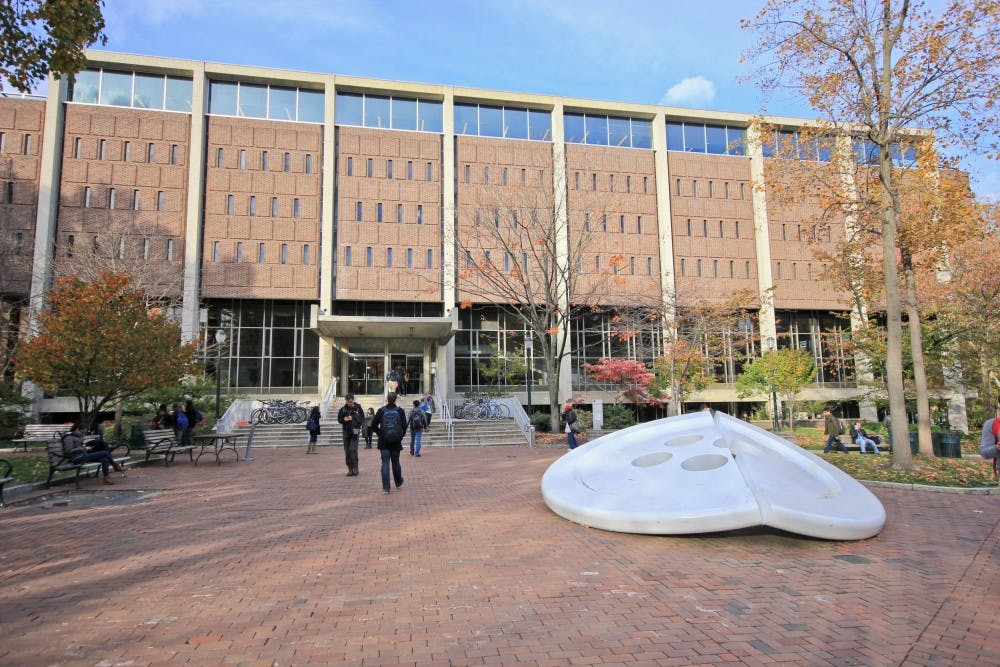After applying for countless work-study positions last fall, College and Wharton freshman Elliot Miciek was disappointed to learn that the only offer he received was a tutoring job for two hours a week. It paid just $17 a week, after taxes. After applying to more jobs at the start of this semester, Miciek was discouraged yet again at the lack of responses.
“I probably sent out 15 emails,” Miciek said. "I only got a few responses and even the ones I did get, none of those offered me a fair amount of hours or were looking for the skills I had.”
Work-study is a component of the financial aid package students can receive when applying for aid from Penn. A cash value is assigned to an aid recipient that represents the maximum total work-study salary the student can earn — and is expected to earn — for that entire year.
If students are not able to earn that amount, however, they are left to find their own resources to substitute for that money.
After attending the Library Job Fair earlier this month and sending out more frantic emails, Miciek found two jobs for the semester — one at the library, getting paid $7.40 an hour for 10 hours a week, and the other at the Penn Language Center, getting paid $11 an hour for six hours a week.
“With those two, I’m gonna get a lot closer to what I should be making but still, not that full amount,” Miciek said.
Miciek's situation is not uncommon at Penn. Senior University Director of Financial Aid Elaine Papas-Varas said work-study students have complained for years about the lack of available jobs, the low pay, and the inconsistencies on — and disorganization of — the official job search website.
Aware of these problems, Papas-Varas said Student Registration and Financial Services has plans to make structural changes to the program to address student concerns in the form of a three-part plan.
RELATED:
Penn reduced financial aid for students living off campus, but many were never notified
Penn announced a new executive director of Student Registration and Financial Services
Low-income but not 'high-need': how some Penn students are left out of programs for those in need
SRFS plans to create a single website to consolidate all job postings, work to raise and standardize salaries, and increase the number of jobs that SRFS deems most desirable to students, she said.
The consolidation of job listings on the SRFS website is scheduled to be completed by January 2019, and the increase and standardization of work-study salaries by the 2019-2020 academic year.
At Penn, approximately 40 percent of undergraduates receive work-study eligibility every year. Students who are granted financial aid in the form of work-study can work at up to two off-campus and on-campus jobs that are offered exclusively to them.
In the 2015-2016 academic year, for unknown reasons, only 56 percent of students awarded work-study were employed at work-study jobs. That year, 4,357 were awarded work-study but 1,911 of those students ultimately were not employed at work-study jobs.
When College freshman Sammy Steeman was searching for a work-study job that would involve biomedical research, she was confronted with an inconsistency between two websites that contained work-study postings.
While she did find research positions available on the official SRFS job search website, she also found other research positions that were seeking work-study eligible students posted on the Center for Undergraduate Research and Fellowships website that were not on the SRFS website.
“When I first applied to jobs, I didn’t know about the CURF website and so I had no idea about all the researchers listed there who were interested in work-study students," Steeman said. “If I had known the CURF website’s ability to find a work-study job through there, I would’ve utilized that because it has a lot more in terms of projects.”
Papas-Varas said that her office has already been adding more work-study positions that students have expressed interest in.
“It’s really important for us to know. The more we know, the more we can fix,” Papas-Varas said. “I never decline an email from a student asking to meet with me. We are the office responsible for this so we should be the ones who are able to provide for the students and answer their questions.”
“Because I am meeting with student groups on a regular basis, it would be helpful for me to hear about jobs which students would want to see increased availability for," Papas-Varas said.



